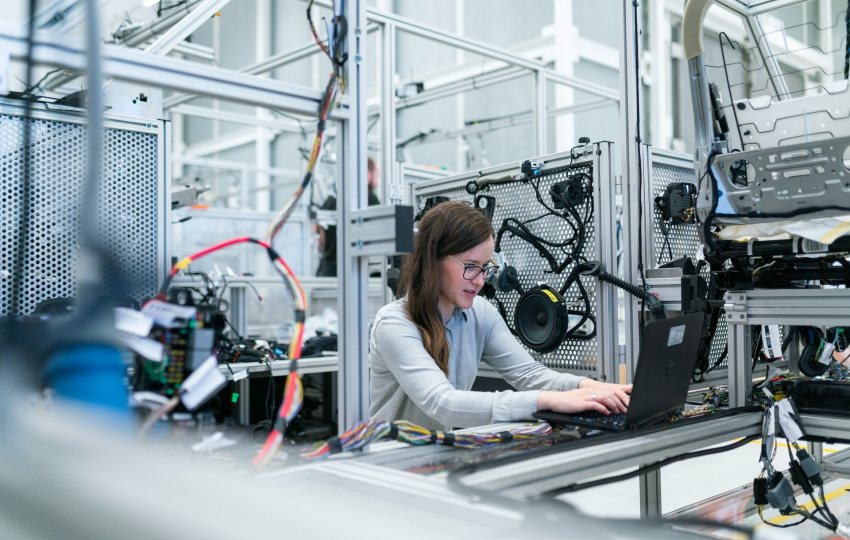The pandemic exposed several flaws in the global production and value chain. As a result, it became necessary for enterprises to develop a well-functioning and adaptable production unit for any future uncertainties. The use of technology to maximize manufacturing is referred to as the digitization of the manufacturing industry. ERP (Enterprise resource planning) software can help you digitally transform your company.
A well-designed ERP system can have a big impact on modern business and digital transformation. It’s a complete system with a single database that consists of several interconnected enterprise resource planning apps. Every application focuses on a specific fundamental process essential to running a business, such as manufacturing.
ERP systems are complicated systems that are integrated with the newest technologies, such as process automation and predictive analytics, despite the fact that they are utilized to run day-to-day tasks. As a result, in this essay, we will discuss The ERP Transformation in the manufacturing industry.
Why does ERP help the manufacturing industry?
ERP has a significant influence on digital transformation. It has the power to deliver revolutionary improvements to a variety of modern corporate operations. An ERP system is a company’s backbone and fundamental business system. A contemporary ERP system becomes a company’s digital backbone when it is implemented through Odoo ERP development services. Having a digital backbone that enables adaptability, agility, and innovation allows businesses to develop, expand, and better meet their consumers’ current and future needs – more efficiently and effectively.
You’ll be able to take advantage of the latest technology and boost your capacity to compete if you implement a contemporary industry-specific ERP system into your manufacturing company.
What are the benefits of the ERP transformation?

ERP leverages technology to streamline processes through connectivity, automation, and intelligence, allowing employees to work more efficiently and enjoy their jobs more. It also enables cross-company collaboration, allowing for more efficient work.
Better customer relations
Giving customers access to their order information, enhancing product quality, delivering faster, anticipating demand more accurately, and learning more about customer demands all contribute to a better customer experience.
Better management
Being able to observe what’s going on across the business in real-time and monitor production and resources allows you to keep on top of things and make changes as needed.
Improved strategy
Using a digital transformation and a contemporary manufacturing ERP system, you can immediately harness your data to properly grasp what’s going on in the business, analyze patterns, understand costs, spot opportunities, and estimate demand. All of this data aids you in making better strategic decisions to keep your business growing.
Optimized production
The ability to reinvent your factory floor, connect to machinery, monitor employee performance, manage warehousing space, and improve workflow contributes to increased productivity. Furthermore, co-using cloud manufacturing software will improve manufacturing business productivity.
Reduced costs
A sophisticated ERP system has the ability to alter a manufacturer’s business by reducing total operational costs while improving efficiency and productivity, even though it can be costly and time-consuming to implement. Automating a labor-intensive and time-consuming manufacturing process can increase output while repurposing surplus resources in more productive sectors. Greater efficiency, improved visibility, and better resource use all contribute to lower costs and higher profitability.
More transparency
ERP systems provide a centralized database, or a single source of truth, that allows information to flow freely inside a firm. A comprehensive data governance program can help the organization get the most out of its data. In addition, this information can help you have a better grasp of the sector.
How to implement the best ERP transformation?

Strategize
Examine your business processes to see what needs to be changed in order to build a more robust and more efficient organization. Next, you’ll need to get your leadership team on board and explain how changing processes to take advantage of technology will result in change. This is the most crucial phase because it is the foundation for all the others, so take a close look at how your company functions, what changes are needed, and how technology can help you make those changes and get everyone on the same page.
Organize your data information
When deploying an ERP, you want to ensure you have accurate data. Therefore, it’s critical to have a strategy in place for cleaning, managing, storing, and archiving various sorts of data.
Your ERP system will preserve all of the data in one place, ensuring that there is only one version of the truth. However, you won’t get accurate analytics if the information you feed into the system is incorrect. So take the effort to clean, organize, and consistently your data so you can gain meaningful insights.
Train your team
To make the most of the ERP system’s new technology, you’ll need to have all of your employees trained on how to use it. It’s no secret that people dislike change, so you’ll need to explain to your staff how this digital revolution will benefit them, the company, and your consumers.
Ascertain that they are completely familiar with the ERP manufacturing software to dive right in and take advantage of all of its features. Because everyone learns differently, you may need to use a variety of training approaches. This is a crucial stage that should not be neglected.
Modify operations
Now is your chance to redesign processes to make them more streamlined and to make full use of the ERP technologies at your disposal. When the whole idea of updating to new technology is to innovate, it doesn’t make sense to keep doing things the same way.
Procedures should be standardized, and as many functions as possible should be automated. Then, figure out how to make the most of the resources at your disposal to achieve the most significant and influential transformation for your company.
In conclusion
To meet all of the requirements mentioned above, you’ll need the correct technologies.
An ERP system is a critical step toward digital transformation in the industrial industry. Overall costs and revenues will be reduced by automating procedures and gaining more significant insights. We hope that this article has given you a better understanding of how ERP is assisting the manufacturing industry to improve.

